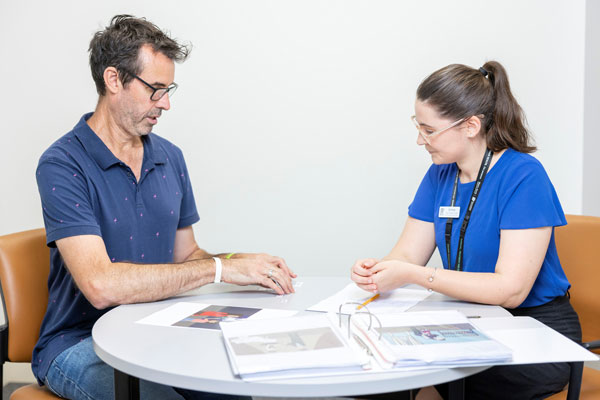 Imagine if you couldn’t remember the correct word for an item or when you read words on a page you couldn’t make sense of them. These are some of the devastating symptoms of aphasia, a neurological disorder caused when parts of the brain responsible for language are damaged.
Imagine if you couldn’t remember the correct word for an item or when you read words on a page you couldn’t make sense of them. These are some of the devastating symptoms of aphasia, a neurological disorder caused when parts of the brain responsible for language are damaged.
Aphasia often occurs as the result of a stroke or a head injury. There are different types of aphasia, depending on the precise location of the damage to the brain and its severity.
People might be familiar with how a stroke can impact on a person’s ability to talk, but aphasia can also affect a person’s ability to understand speech or printed words, or even find the correct word they need.
People who experience aphasia are at risk of long-term consequences as a result of their condition, including social isolation, depression, and poor quality of life for themselves and their family members.
Speech pathologists play a vital role in helping people with aphasia. The STARS Speech Pathology team and the University of Queensland’s Aphasia Research Centre (QARC) are passionate about increasing awareness of people living with a communication disability due to aphasia.
Emma and Kat are two of our STARS speechies who work with people with aphasia. Their roles are quite varied depending on how the patient has been affected but can involve helping people to improve their reading, writing, listening, and talking.
“Aphasia can impact someone’s communication and daily life quite differently, and so all the treatment we provide is personalised to suit the individual’s goals,” Emma said.
“We believe that communication is a human right – it plays a part in everything we do, so we help people with aphasia to return to activities that are important for them.
“We might help someone to say the names of their family members, order their favourite meal, read a novel, write text messages, or practice conversations they can have with loved ones. We can also work closely with the rehabilitation team to support people who want to return to work, study or volunteering.”
STARS offers a specialist treatment program for people with aphasia, called the Comprehensive High-Dose Aphasia Treatment or CHAT. CHAT is an eight-week intensive program, where patients receive comprehensive, evidence-based, and personalised aphasia therapy. This involves a combination of one-to-one therapy, group work and computer-based sessions, including education on aphasia for the people with aphasia and their families/friends.
CHAT is primarily delivered by the STARS speech pathologists, with support from allied health assistants, speech pathology students and a STARS social worker.
CHAT at STARS has received overwhelmingly positive feedback from both people with aphasia and their support people. One man in his 70s with mild aphasia said that before CHAT he avoided all social settings due to the stress associated with conversation. In his own words, he described how he felt in week four of the CHAT program:
“Last night, in particular, we went to the golf club. I spoke fluently and I didn’t have any hiccups. It was just like the old days. See the way I’m talking? It’s so much better. Its fluent. I’ve got big words that I couldn’t say before… that’s all happened in the last four weeks.”
Other comments from participants and their family include:
“Thank you for the marvellous work you are doing for all of us. We are seeing and feeling growth each-time we come in. All your team are exceptional, and we feel very privileged to have this opportunity.”
“The CHAT program has been the most rewarding experience. Everyone in the team made us welcome and cared for. A very hard-working team, always organised and pleasurable. We were always met with a smile, nothing was too much trouble for the team. Thank you all”.
CHAT is one of a kind for the southern hemisphere, translating research done on the ground into clinical practice.